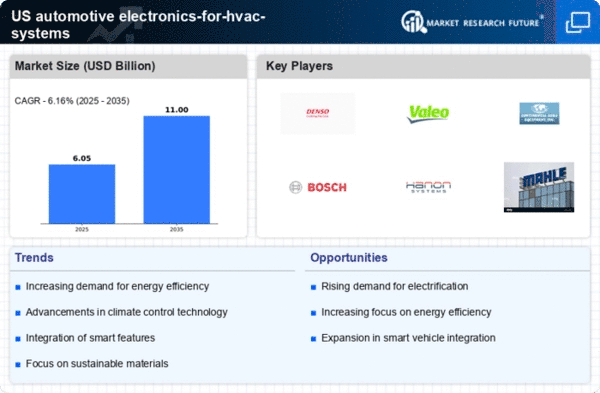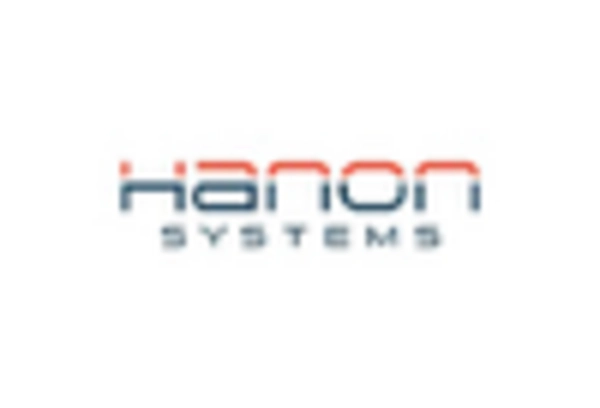Regulatory Push for Emission Standards
The automotive electronics-for-hvac-systems market is significantly influenced by stringent regulatory frameworks aimed at reducing vehicle emissions. In the US, regulations set by the Environmental Protection Agency (EPA) mandate lower greenhouse gas emissions, compelling manufacturers to adopt more efficient HVAC systems. These systems often incorporate advanced electronic controls that optimize energy use, thereby contributing to compliance with these regulations. The market is projected to grow as automakers invest in technologies that not only meet regulatory requirements but also enhance overall vehicle performance, potentially increasing the market size by 10% over the next few years.
Increased Focus on Vehicle Connectivity
The automotive electronics-for-hvac-systems market is increasingly influenced by the growing emphasis on vehicle connectivity. As vehicles become more connected through the Internet of Things (IoT), HVAC systems are being integrated with other vehicle functions to enhance user experience. This connectivity allows for remote control of climate settings via mobile applications, which is becoming a sought-after feature among consumers. The market is expected to grow as automakers invest in connected technologies, with estimates suggesting a potential increase of 18% in market size as these features become standard in new vehicle models.
Shift Towards Electrification of Vehicles
The automotive electronics-for-hvac-systems market is witnessing a shift towards the electrification of vehicles, which necessitates the development of more efficient HVAC systems. As electric vehicles (EVs) become more prevalent, the demand for HVAC systems that operate effectively without relying on traditional combustion engines is increasing. This transition is expected to drive innovation in the automotive electronics-for-hvac-systems market, as manufacturers seek to create systems that optimize energy consumption while maintaining comfort. Analysts suggest that this shift could lead to a market expansion of approximately 20% in the coming years, as more consumers opt for EVs.
Rising Consumer Demand for Comfort Features
The automotive electronics-for-hvac-systems market experiences a notable surge in consumer demand for enhanced comfort features within vehicles. As consumers increasingly prioritize comfort, automakers are integrating advanced HVAC systems that utilize sophisticated electronics to provide personalized climate control. This trend is reflected in the growing sales of vehicles equipped with multi-zone climate control systems, which have seen an increase of approximately 15% in recent years. The automotive electronics-for-hvac-systems market is thus driven by the necessity to meet these evolving consumer expectations, leading manufacturers to innovate and enhance their product offerings.
Technological Advancements in Sensor Integration
Technological advancements in sensor integration are reshaping the automotive electronics-for-hvac-systems market. The incorporation of sensors that monitor cabin temperature, humidity, and air quality allows for more precise control of HVAC systems. This innovation leads to improved energy efficiency and user comfort, as systems can adjust automatically based on real-time data. The market is likely to see a rise in demand for such smart HVAC solutions, with projections indicating a growth rate of around 12% annually as manufacturers increasingly adopt these technologies to enhance vehicle appeal and functionality.

















